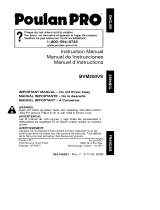
-- 4 --
D Make sure the unit is properly assembled
and in good operating condition.
D Do not fill fuel tank while engine is hot or
running.
D Avoid spilling fuel or oil. Wipe up fuel spills
before starting engine.
D Move at least 10 feet (3 meters) away from
fuel and fueling site before starting engine.
D Always store gasoline in a container ap-
proved for flammable liquids.
OPERATE Y OUR UNIT SAFELY
WARNING: Stop the engine before
opening the vacuum inlet door. The engine
must be stopped and the impeller blades no
longer turning to avoid serious injury from the
rotating blades.
D Inspect unit before each use for worn,
loose, missing, or damaged parts. Do not
use until unit is in proper working order .
D Keep outside surfaces free of oil and fuel.
D Never start or run engine inside a closed
room, building or other unventilated area.
Breathing exhaust fumes can kill.
D To avoid static electricity shock, do not
wear rubber gloves or any other insulated
gloves while operating unit.
D Do not set unit on any surface except a
clean, hard area while engine is running.
Debris such as gravel, sand, dust, grass,
etc. could be picked up by the air intake a nd
thrown out through discharge opening,
damaging unit, property, or causing serious
injury to bystanders or operator .
D Avoid dangerous environments. Do not use
in unventilated areas or where explosive
vapors or carbon monoxide build up could
be present.
D Do not overreach or use from unstable sur-
faces such as ladders, trees, steep slopes,
rooftops, etc. Keep firm footing andbalance
at all times.
D Never place objects inside the blower
tubes; always direct the blowing debris
away from people, anim als, glass, and solid
objects such as trees, automobiles, walls,
etc. The forceof air can causerocks, dirt, or
sticks to be thrown or to ricochet which can
hurt people or animals, break glass, or
cause other damage.
D Never run unit without the proper equip-
ment attached. When using your unit as a
blower, always install blower tubes. When
using your unit as a vacuum, always install
vacuum tubes and vacuum bag assembly.
Make sure vacuum bag assembly is com-
pletely zipped.
D Check air intake opening, blower tubes,
vacuum tubes, and elbow tube frequently,
always with engine stopped and spark
plug disconnected. Keep vents and dis-
charge tubes free of debris which can ac-
cumulate and restrict proper air flow.
D Never place any object in the air intake
opening as this could restrict proper air flow
and cause damage to the unit.
D Never use for spreading chemicals, fertil-
izers, or other substances which may con-
tain toxic materials.
D To avoid spreading fire, do not use near
leaf or brush fires, fireplaces, barbecue
pits, ashtrays, etc.
D Use only for jobs explained in this manual.
MAINTAIN YOUR UNIT PROPERLY
D Have all maintenance other than the rec-
ommended procedures described in the in-
struction manual performed by an autho-
rized service dealer.
D Disconnect spark plug before performing
maintenance except for carburetor adjust-
ments.
D Use only recommended Poulan replace-
ment parts; use of any other parts may void
your warranty and cause damage to your
unit.
D Empty fuel tank before storing the unit. Use
up fuel left in carburetor by starting engine and
letting it run until it stops.
D Do not use any accessory or attachment
other than those recommended by manufac-
turer for use with your unit.
D Do not store the unit or fuel in a closed area
where fuel vapors can reach sparks or an
open flame from hot water heaters, electric
motors or switches, furnaces, etc.
D Store in a dry area out of reach of children.
SPECIAL NOTICE: Exposure to vibra-
tions through prolonged use of gasoline pow-
ered hand tools could cause blood vessel or
nerve damage in the fingers, hands, and
joints of people prone to circulation disorders
or abnormal swelling. Prolonged use in cold
weather has been linked to blood vessel dam-
age in otherwise healthy people. If symptoms
occur such as numbness, pain, loss of
strength, change in skin color or texture, or
loss of feeling in the fingers, hands, or joints,
discontinue the use of this tool and seek
medical attention. An antivibration system
does not guarantee the avoidance of these
problems. Users who operate power tools on
a continual and regular basis must monitor
closely their physical condition and the condi-
tion of this tool.
SPECIAL NOTICE: For users on U.S. For-
est Land and in some states, including Cali-
fornia (Public Resources Codes 4442 and
4443), Idaho, Maine, Minnesota, New Jersey,
Oregon, and Washington: Certain internal
combustion engines operated on forest,
brush, a nd/or grass covered land in the above
areas are required to be equipped with a
spark arresting screen, maintained in effec-
tive working order, or the engine must be con-
structed, equipped, and maintained for the
prevention of fire. Check with your state or lo-
cal authorities for regulations pertaining to
these requirements. Failure to follow these
requirements is a violation of the law. This unit
is not factory equipped with a spark arresting
screen; however, a spark arresting screen is
available as an optional part. If a spark arrest-
ing screen is required in your area, contact
your authorized service dealer for the correct
kit. The spark arresting screen, blower tubes,
and nozzles must be assembled to unit to be
in full compliance with regula tions.













